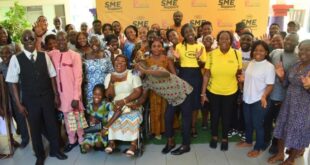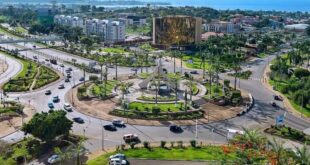SELECTIVE JUSTICE; A THREAT TO FIGHTING COVID – 19 PANDEMIC IN GHANA
When Ghana’s President Nana Addo Dankwa Akufo-Addo issued a directive instructing everyone to observe protocols as recommended by the world health organization in the fight against the novel, deadly COVID-19 that continued ravaging even the advanced of nations, all hail the leader for his decisive decision. The imposition of restrictions Act passed by parliament empowered the President to issue orders to ensure the safety of the citizenry. The president issued the directive after the country recorded many cases (in 100s) of the COVID-19 in the country. The president went further to direct all borders of the country including land, sea, and air be closed thus preventing any entry or going out of the country. By then all the positive cases recorded were vertical or imported. According to the President “We now see that the decision to close down our borders has been justified. One hundred and five (105) of the confirmed cases came from those who were mandatorily quarantined and tested on their arrival on the 21st and 22nd of March. One hundred and ninety-two (192) of the cases came from travelers, who entered our country before the closure, and their contacts. Seventy-nine percent (79%) of the three hundred and seventy-eight (378) confirmed cases are, thus, imported. Until we have the situation fully under control, we cannot, at this time, open our borders. They will have to remain shut until further notice”. The President justified his decision.
It was not an easy decision for the president to make considering the consequential debilitating ramifications on the economy and social life in general among other things. Indeed, the effects were beyond expectation as the various sectors of the economy suffered immensely. The hospitality and aviation industry have been the immediately hard hit as they had to partially shut down and ground respectively and consequently most workers had to be laid off. The disease continued to wreak havoc on almost all sectors of the economy.
As the health among other frontline workers tracked, traced and treated patients affected by the disease, perhaps the most effective and important decision that the president had to grudgingly take was the ban on social gathering and partial lockdown of some part of the country namely Greater Accra, Greater Kumasi, Tema and Kasoa in his 4th address to the nation on the fight against COVID-19 pandemic. With a total of 450 teams ‘..the partial lockdown of Accra and Kumasi has facilitated a more aggressive programme of enhanced contact tracing’, the president noted.
Some few exemptions included health workers, parliamentarians, food/stuff sellers among other essential workers of institutions like Electricity Company of Ghana, Ghana Water Company Limited, Volta River Authority, Ghana Revenue Authority, etc. This directive by the President seems to have the most direct tolling effect on the people. Affected the most are those in the informal sector including market folks, barbers, shoeshine boys, farmers, fisherfolks, petty traders, etc. To help lessen the effect of the lockdown especially on the economic lives of the people, the president in his 5th and 6th addresses announced some freebies for the frontline workers and a three-month (from April to June)free water bills for all users and 100% free electricity for those who consume 50 or less kW per month and 50% free electricity for other users among other reliefs. Furthermore, water tankers, publicly and privately-owned, are being mobilized to ensure the supply of water to vulnerable communities. We have decided on further measures of mitigation for all Ghanaians for the next three months, i.e. April, May, and June. The government will fully absorb electricity bills for the poorest of the poor, i.e. for all lifeline consumers, that is free electricity for persons who consume zero (0) to fifty (50) kilowatt-hours a month for this period. In addition, for all other consumers, residential and commercial, Government will absorb, again, fifty percent (50%) of your electricity bill for this period, using your March 2020 bill as your benchmark’’, the president stated. In the president’s words, “This is being done to support industry, enterprises and the service sector in these difficult times, and to provide some relief to households for lost income”.
Presenting the statistics as at that time, the president noted that ‘…we now have, in total, three hundred and seventy-eight (378) confirmed cases of infections, with six (6) deaths, four (4) recoveries, two (2) in critical condition, and the remaining three hundred and seventy (370) are mild cases, who are in isolation, and are either being managed at home or at treatment centers.
Delivering his 7th COVIS-19 address to the nation following careful examination of the situation and upon consultations with his experts, the president unlocked the lockdown thus lifting the ban but not on the protocols. This move by the president was met with mixed reactions across the country. The Ghana Medical Association that earlier opposed such a decision on the hindsight gave the president benefit of the doubt since the health sector was not the only factor considered. Due to the impact of the lockdown on the country’s economy and the socio-economic lives of the people, the president’s decision was a piece of welcomed news to especially those under the lockdown area and they demonstrated this the moment it was lifted by pouring on the streets in jubilation. Many continued to wonder why the president took such a decision but posterity is the best judge whether he took the right decision.
Interestingly since the unlocking of the lockdown, the cases kept spiking in the hundreds. At the time of writing this piece on May 8, 2020, the Ghana health service had recorded 4,012 positives COVID-19 cases with 323 recovered and 18 deaths out of over 130,000 (one hundred and thirty thousand) tested cases.
The easing of the President’s directive was only the lifting of the lockdown in the selected areas and did not include the global protocol as suggested by the World Health Organisation – washing hands with soap under running water, wearing nose mask, keeping social distance and using hand sanitizer, etc. The directive by President Akuffo Addo to place a ban on mass gathering and ensuring social distancing so as not to transfer the disease from one person to another through droplets of saliva etc. as people interact, has not been without violating despite traditional authorities across the country vouching for their support as they admonished their people to conform with the president’s directive. The Yaa-Naa in support of the President’s directive placed a ban on mass gathering in his jurisdiction just like the Okyehene had also done among other traditional rulers.
Right from the first day of placing the ban in March to date, people continued to flout it. According to the police during the lockdown, some 406 persons were arrested for violating restrictions on the executive order on the social gathering. In Dzodze, the Municipal capital of Ketu North some 45 persons including a nursing mother were arrested by the police while partying and swimming in deliberate disregard for the law. In a similar fashion in Tamale, the Northern regional capital, the police command arrested two wedding guests Iddi Ibrahim and Abubakar Yusif Dawda whiles inviting the couple for questioning. In another instant in Tamale, a team of security persons led by the Metropolitan chief executive who was also the Metro security head stormed a mosque and arrested two Muslim congregants for the similar violations as they observed prayer.
Again, in the Volta region, a Pastor and two of his congregants were arrested, prosecuted, and imprisoned in this regard. Pastor Apostle Sampson Agakpe, founder of the church of Pure Christ in the Volta region with his assistant pastor Maxwell Dzogoedzikpe and secretary, Samuel Agakpen who held church service with some 50 of their members -who escaped- thus flouting the ban on the religious gathering. They had been jailed for four years each by the Kpando circuit court in the Volta region because they were not able to raise the Gh Ȼ13,200 fine slapped on each of them hence they had to suffer the alternative sentence of four years imprisonment. In Sawer, a suburb of Somanya in the Eastern region, the police have arrested and are prosecuting 14 persons for performing puberty rights (Dipo) which is in the bridge of the directive on social distancing.
Several of such violations of the president’s executive order especially on the mass gathering and observation of social distancing had occurred and the police had not rested on their ores but arrested the persons involved and made them face the full rigors of the law. According to the police account, over 400 of such violators are facing the law. It is in view of this that the very recent installation of a new Akuapenhene, Oseadeyo Kwesi Akuffo, at Akropong in the Eastern region on May 1, 2020, needed to be condemned in no uncertain terms. It is a flagrant violation of the president’s directive on the ban on mass gathering and social distancing. In a jubilant procession along the principal streets of the town, the traditional rulers and kingmakers who were expected to have known better showcased the new Akuapenhene amidst heavy security guard and escort to the people without regard to social distancing and wearing of a nose mask, which clearly had the tendency of putting the people of the area in danger of contracting the COVID-19 pandemic.
The situational irony is that the same police who were prosecuting persons involved in similar acts were seen involved in the act themselves thus also committing the same crime they were prosecuting others for. Many patriotic and well-meaning Ghanaians have called for the arrest and prosecution of any person involved no matter their clout. The unwarranted action by the violators had raised a myriad of questions in this regard. For instance, who authorized the installation cognizant of the president’s directive? Was the regional minister who was also head of the Regional Security Council aware? If he was what did he do to stop or remind the people of the ban on mass gathering or ‘order from above’ could not let him interfere? Was the Inspector General of police aware and was he the one who provided the security and ensured full guard for the installation of the new chief? Was it not the same police under his watch that were prosecuting over 400 persons for disregarding the same directive and how come he could not order the arrest and prosecution of the people in this instance? Was the interior minister aware and was he the one who presumably either deliberately bypassed the president’s order or acted upon an order from the president and allowed the condemnable act to take place? What about national security? On the other hand, was the president himself as the commander-in-chief of the Ghana armed forces in the know of the installation? If he did know what did he do about it?
Another contemptuous disregard for the president’s directive was by the electoral commission when the electoral body summoned its officers for training in preparation for the upcoming general elections and not even a court order restraining it could make the commission rescind its decision. These deliberate snubbing of the president’s order is a cause for worry. But a greater cause for worry is the president’s silence over all these happenings especially in the case of the electoral commission and the installation of the Akuaapem chief which was openly guarded by the presence of heavy state security. Contrary to the security agent’s swift arrest and prosecuting of over 400 persons, they grudgingly effected the arrest of some four chiefs in relation to the installation of the Akuapem chief – which was as a result of public uproar calling for prosecution. Initially, the police found it difficult pressing charges against the chiefs with the excuse that they were traditional rulers with large following hence they were granted bail and later arraigned before the Akropong circuit court and slapped a fine of Gh ¢12,144 each upon their plea which action was contrary to paragraph 1 subsection A of the Executive Instrument 64 and Section six of the Restriction Imposition Act 2020. This charge, many have described as smacking of injustice considering the weight of their action as compared to the GhȻ13,200 slapped on the pastor and two of his administrators.
Ghana continues to be a beacon of hope for Africa even in the fight against COVID-19. The country has from the onset of the global pandemic till now shown exemplary leadership in this direction but the gains may be eroded if the leadership of the country does not step its foot on the ground to eradicate the seeming deliberate disregard for the law. ‘What is good for the goose is good for the gander’ and the law as enshrined in Article 17 of the 1992 republican constitution of Ghana stipulated in black and white that ‘’All persons shall be equal before the law’’. Therefore, the law must not be seen used to prosecute ordinary citizens but thrown away and letting go of people in high authority – traditional or public. The worry is that the president’s authority is grossly undermined by not just the ordinary people but also those he personally appointed to help him run the affairs of the country successfully and this is a recipe for even greater noncompliance. This phenomenon if not checked has the tendency of eroding the successes chalked up thus far in the fight against COVID-19 pandemic. Otherwise, it would give credence to those who believe these actions of impunity (especially the case of the EC and the installation of Akuapemhehe) were not without the taciturn approval and backing of the leadership of the country hence asking whether the president is not violating his own directive?
By Osman Dawda
Multimedia and Communications Consultant, Lecturer, Journalist, Social Justice, and Human Rights Advocate, Student of Mysticism, and Philosophy.
princeod@gmail.com
0244530050
 Savannah News Online Reporting Only What Matters Most
Savannah News Online Reporting Only What Matters Most



